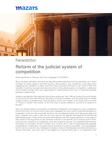
Reform of the judicial system of competition
Much has been said about reforming the laws that prohibit restrictive business practices, such as the formation of cartels, abuse of dominant position, among others, and, in particular, it has been done suggesting the imposition of higher fines than those currently enshrined in Law 1340 of 2009. But very little, if anything, has been said about the reform of the judicial system of competition, understood as the system through which the responsibility of market players who incur in restrictive business practices is determined.
Justice is perhaps the most important value that a society can have. Without Justice, the social system (or the social contract referred to by Rousseau) is bound to collapse, and we would pass to a State of Nature where, as Hobbes said, "man would be a wolf to man himself". John Rawls said in his book "A Theory of Justice" that Justice "is the first virtue of social institutions, as truth is to systems of thought".
Now, the judicial system of competition in Colombia is designed -as it happens in many jurisdictions around the world- so that the same entity that investigates the occurrence of restrictive practices of competition is the one that eventually sanctions the investigated parties, thus becoming judge and party. Likewise, this entity is also the one that resolves the appeals filed against the sanctioning administrative acts. Finally, when suing the administrative acts that impose sanctions, a new stage of total review of the arguments of fact, evidence and law is not opened, but it must be proven there, only that such resolutions are vitiated by nullity due to specific causes. It is predictable that whoever formulates an accusation, tends to sanction such conduct, and in case the opposing party requests a rectification or modification, it is logical that he maintains or confirms his position. This is predictable, but it is not fair, since the very ontological concept of Justice is that disputes should be resolved by a neutral third party, and such right to be judged by a neutral third party is a fundamental right recognized by all human rights treaties currently in existence, and may derive from a natural right without which the harmony necessary to preserve the social fabric would be broken.
The purpose of competition protection systems is to generate efficiencies in the market; efficiencies that ultimately result in benefits for competitors, consumers and competition itself. This economic efficiency cannot be confused with legal efficiency. The former exists when markets develop naturally, based on the forces of supply and demand, and the latter exists when the legal scaffolding to enforce the rules depends on the same party that is making the accusation. The first type of efficiency is laudable (and is what the Chicago school, which distrusts the State and trusts the markets, has always intended); the second is contrary to the principles of Justice that irrigate our legal system.
Not all competition protection systems suffer from this structural flaw. The U.S. system, for example, establishes that both the U.S. Department of Justice ("DOJ") and the Federal Trade Commission ("FTC"), as the entities in charge of conducting the investigation, must go before a neutral Judge, who will be in charge of making any kind of decision in the case. This system, although not as legally "efficient", is a process that respects the fundamental pillars of the concept of Justice. Before thinking about increasing the fines that can be imposed for this concept, it is necessary to think about how our judicial system of competition can be adapted so that -as it happens in the United States- the fundamental principle of Justice is respected.


